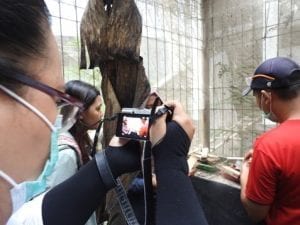
The Center for Agrotechnology Innovation (PIAT) UGM again received a visit on Monday (9/3). The visit was from representatives of the Subang Saemaul Indonesia Globalization Foundation (YGSI) Chapter. This foundation is a non-profit organization based in the UGM Faculty of Philosophy with an orientation towards community empowerment. The foundation is engaged by getting funding from the Saemaul Globalization Foundation, South Korea.
The morning visit was carried out by directly visiting and learning about maggot cultivation and waste processing at the Recycling Innovation House (Rindu). Later, maggot which is a larval type of maggot from the Black Soldier Fly (BSF) flies became the new belle. This stems from research findings that reveal that maggot has a high protein source so that its prestige is on the rise among farmers and among the public. This is also part of the background for YGSI’s visits.
“It supports our fostered village in Subang to replace high-protein fish meal. We want the discourse to use maggot flour. Although both are high in protein, their procurement is more likely to use flour and is easier to use in the village, “said Pradita Nurmaya Kusuma as the Chair of YGSI. Pradita further explained that the use of maggot-based pellets has a more affordable price compared to fish meal-based pellets. If fish flour-based pellets are sold at a price range of Rp 9,000 / kg, then pellets based on maggot flour are only sold at Rp 6,500 / kg with a price difference of Rp 2,500 / kg.
 |
 |
The activity was accompanied and directed by Pipit Noviyani as the Field Coordinator (Korlap) of the Energy and Waste Management Sub-Sector along with Arif Mujaab as the waste treatment team who explained in detail how the stages of implementation were in the maggot breeding. In this case, Arif revealed that there are obstacles currently being faced. “We have managed to catch two rats suspected of reducing the population of baby maggot. We are proposing to procure additional equipment so that the maggot development site can be made more closed so that the maggot can regenerate continuously, “he said.
The next activity was followed by visiting a waste treatment facility in the form of enumerating plastic waste and seeing the process of making organic fertilizer, leaves of sweeping results from the UGM campus. The results of the processed organic waste produce fertilizer which is packaged in a five-kilogram bag. The closing activity on the day ended with a light discussion at the PIAT headquarters. “We will finalize the concept because we have a Waste Management Site (TPS) program plan. Incidentally in Subang there is also no 3R TPS (Reduce, Reuse, Recycle) even though there is a lot of organic and inorganic waste that must be handled as well, “Pradita explained.
